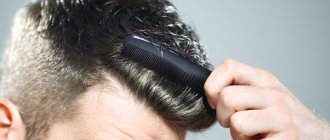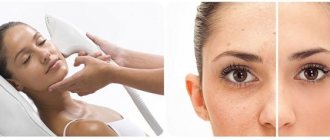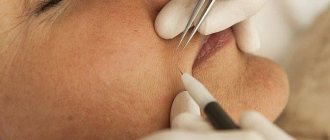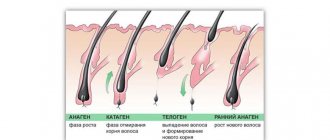How much hair does a person lose every day?
The entire human body is covered with hair with the exception of the palms and feet. Each of them has about 5 million, of which 100-150 thousand are on the head. From 50 to 150 pieces are lost every day, and the same number begins to grow. This highly individual parameter is influenced by:
- heredity;
- number of follicles.
To determine the intensity of precipitation, a simple experiment is carried out. The hair is divided into strands and each of them is pulled forcefully, but gently. If you have up to 15 pieces left in your hands. - this is the norm, if their number exceeds 25-30 - pathology is obvious. But excessive hair loss is not the only problem. Active hair growth, especially in unwanted places, causes no less worry.
Why does hair grow so fast
Hair growth begins during fetal development. The body of a 100-day embryo is already covered with fluff, which later falls out. In the follicles, cell division occurs, which gives rise to hair growth. Division activity depends on the EDAR gene. That is, the growth rate is influenced by the hereditary factor.
Age also matters. During puberty (11-18 years), hair growth accelerates due to increased production of sex hormones. It also depends on the time of year. In spring and summer it increases, since during this period metabolic processes in the body accelerate. In any case, the monthly increase is about 1 cm per month.
Approximately 5-10% of women are susceptible to hirsutism - male pattern hair growth. Vellus hair becomes coarse and terminal in unusual places: above the upper lip, chin, back, along the white line of the abdomen. This process develops due to endocrine (hormonal) and non-hormonal reasons.
Hirsutism is predominantly endocrine in nature, caused by:
- hormonal imbalance due to metabolic disorders, pregnancy, childbirth, age-related changes, stress, diets and other factors;
- polycystic ovary syndrome (PCOS, Stein-Leventhal syndrome), which causes not only hirsutism, but also irregular menstrual cycles, amenorrhea, uterine bleeding, infertility, and excess body weight;
- Cushing's syndrome, which is characterized by increased levels of cortisol produced by the adrenal glands.
Non-hormonal reasons include:
- hereditary predisposition;
- race and nationality;
- taking hormonal drugs.
Sometimes the cause of hirsutism cannot be determined. In such cases it is called idiopathic. According to the International Classification of Diseases (ICD-10), hirsutism is coded L68.0. It is classified as a disease of the skin and subcutaneous tissue.
Ways to remove unwanted hair
Before you get rid of rapidly growing unwanted hair, you should find out the reasons for its appearance and accelerated growth. Perhaps they are caused by endocrine diseases that require a different approach to treatment. Unwanted body hair is removed through depilation and epilation.
During the depilation process, the follicle is not affected, only part of it is destroyed. Gradually, the density, thickness of hair, and growth rate increase. There is a need for more frequent procedures. Depilation includes the following methods.
- Razor and depilator. The cheapest method, does not require visiting a cosmetologist. There is a high probability of cuts, dry irritation, and ingrown hairs. The procedure should be carried out at least twice a week.
- Bioepilation (waxing, sugaring). The method is painful and causes the risk of ingrown hairs and irritation of the treated area. The duration of the effect is from 1 to 1.5 months.
Hair removal is more effective than depilation. It will be discussed below.
Is taking hormonal drugs dangerous for hair?
However, not all women are ready to use this method of contraception.
- What is this connected with?
- How harmful or, conversely, useful are these pills?
- Why does hair loss occur after stopping OC and is it worth panicking about this?
- What to do to stop hair loss?
Taking any medication causes certain side effects. Often, after stopping OCs (oral contraceptives), women experience hair loss. To understand why hair loss occurs from oral contraceptives, let's consider their principle of action.
Any oral contraceptive primarily belongs to the group of hormonal drugs. Hormonal drugs directly affect the balance of hormones in the body, which means their use can cause hormonal imbalances, which in turn leads to hair loss. Hormonal drugs (and this group includes oral contraceptives) affect the balance of hormones in the body.
Their level must be maintained at a certain level, because they, together with vitamins and minerals, activate hair growth. When starting to use OCs, changing pills, or after stopping them, a hormonal imbalance occurs, which also entails alopecia. It often happens that a woman successfully takes OCs for several years, and after stopping them, problems with baldness appear.
Relationship between OCs and alopecia
After stopping OC use, the intensity of hair loss directly depends on the type of oral contraceptives used. There are three groups of them:
- Combined drugs (estrogen-progestogen) are the safest. They are artificial analogues of natural female hormones. These drugs contain a small amount of hormones; the likelihood of baldness when using these contraceptives is minimal.
- Progestin drugs are used to treat gynecological diseases. Hair loss with their use is observed more often than with combined OCs.
- Postcoital medications contain very high levels of hormones, which entails significant hormonal imbalances. The risk of hair loss is quite high.
Therefore, if you stop taking oral contraceptives and find that you are experiencing more hair loss than usual, be sure to conduct a complete diagnostic of your body to identify hormonal abnormalities.
After discontinuation of OCs, testosterone levels increase, and this contributes to the appearance of bald spots. However, the main cause of hair loss is an imbalance of another hormone - dihydrotestosterone. An excess of this male hormone in combination with a genetic predisposition is the main cause of baldness.
Here is what Dermatologist, Endocrinologist, Candidate of Medical Sciences Vladislav Petrovich Tkachev says about Hormonal hair loss: “This loss is caused by the abrupt withdrawal of hormonal medications, many of which create a favorable background for hair. In this case, only a doctor can prescribe the necessary replacement therapy. The same “hormonal thinning” occurs after abortion.
True, it most often stops after a month and a half. This group also includes postpartum hair loss. It is easily explained: during pregnancy, hair grows well, there is 10% more of it - after all, the placenta appears, an additional organ that secretes hormones.
After nine months, the placental “doping” ends, and the nursing mother is faced with intense “molting,” which should not be regarded as a disease. The normal physiological reaction is hair loss within eight months after childbirth.”
Many women notice that after stopping the use of oral contraceptives, their hair changes its structure, begins to fall out rapidly, and quickly becomes oily. And the whole body as a whole becomes vulnerable: pimples appear on the skin, weight increases, mood swings often occur...
The reason for all these unpleasant phenomena is that the body suddenly stopped receiving ready-made hormones that it received when taking hormonal contraceptives. Therefore, you should not worry too much, you just need to be patient and let your body adapt to the new state.
Usually, hormone levels return to normal within a maximum of six months after stopping oral contraceptives. However, you shouldn’t let everything take its course. You should direct your efforts to finding a good trichologist to get advice and conduct the necessary research - this will help speed up the recovery of the body.
Ideally, it would be if you do this in advance, before you stop taking birth control, in order to smooth out the consequences of withdrawal. You will definitely need to test your blood for biochemistry and perform a phototrichogram - this will be useful in the future if hair problems cannot be resolved for a long time.
How to prevent baldness after stopping taking OK
This problem is not new, so here are some recommendations for women using birth control pills: Research your ancestry. If anyone in your family has suffered from hair loss, you may have a genetic predisposition to alopecia. In this case, you should not use birth control pills at all. It is better to use other, non-hormonal methods of preventing pregnancy.
If genetic causes of baldness are identified, a trichologist will provide you with professional assistance. Do not use OCs with a high content of progesterone and other substances similar to it: miniziston, demoulin, microgynon and others. If your hair loss was affected by the discontinuation of OCs, you can either resume taking them again, or be patient and wait until the situation with hormones settles and hair growth resumes on its own.
To help the body recover faster, you need to take vitamin and mineral complexes and live an active life. Strong physical activity helps maintain the balance of hormones, and they regulate the intensity of hair growth.
Sometimes a woman stops taking oral contraceptives when she loses her sexual partner and believes that she is no longer in danger of becoming pregnant. This is the right move, but keep in mind that if you want to use hormonal contraception again, you need to choose it together with a gynecologist, who will find out what changes have occurred in your body during the period of refusal to take contraceptives and select a new suitable drug.
It is important to understand that the selection is extremely individual. Before you start using hormonal contraceptives, you should conduct a complete examination of your body. The drug should be selected taking into account age, hormonal characteristics, the state of the reproductive system, and concomitant diseases.
Then, after stopping OK, there will be fewer problems associated with hair loss. Unfortunately, many people do not consider this mandatory. As a result, you have to change medications repeatedly to finally find one that is compatible with your body.
We wish you health and beautiful hair!
Ways to slow down body hair growth
Slowing or stopping hair growth is possible with the help of special drugs - inhibitors. They are available in the form of creams, lotions, oils, sprays and have virtually no contraindications other than individual intolerance and possible allergic reactions. The action of the active components is aimed at slowing down metabolic processes and destroying the connections between cells in the follicles. Adjacent tissues remain untouched.
Folk remedies used after depilation also effectively slow down hair growth.
- Turmeric (65-70 g) is dissolved in water until a paste is obtained. Leave for 15-25 minutes. Apply to the skin and cover with polyethylene. Wash off after 10-15 minutes.
- Castor oil (5 ml), medical alcohol (40 ml), iodine (1.5 ml) are mixed. The resulting solution is wiped over the skin twice a day.
- Quicklime (10 g) mixed with calcium sulfite (10 g) is applied to the skin. It washes off after half an hour.
Folk remedies can cause allergic reactions provoked by one or more components. Before using them, it is recommended to conduct a test: apply the selected product to a small area for 10-20 minutes. Accessibility and ease of use are the main advantages of traditional methods. But they also have a serious drawback - low efficiency.
How often does the procedure need to be repeated?
In one laser hair removal session, you can remove about 15 - 20% of the hair.
Therefore, when answering the question - how many laser hair removal treatments are needed repeatedly, you need to take into account the rate of hair growth. On average, the interval between procedures is 6 – 12 weeks. There is no point in coming for laser hair removal before this date, since the effect of it is reduced many times. If the break between the first and second sessions is no more than two months, then between the last and penultimate procedure the interval can increase several times. This is due to the fact that each subsequent exposure to laser beams slows down hair growth, which means that you will have to wait longer.
Hair growth inhibitors
The most effective pharmaceutical agent that slows down hair growth is 1% Rivanol (RIVANOL). It belongs to medicinal cosmetics and is intended for skin care on any area, including the face and bikini area.
Rivanol restores damaged tissue, eliminates redness, and fights inflammation. It does not penetrate deep into the skin and has an exclusively local effect on the hair follicle, without damaging nearby tissues, but, on the contrary, improving their condition.
Using a cotton pad, apply a small amount of solution to areas of unwanted hair growth. After a few minutes, the procedure is repeated. After 10 minutes. the product is washed off completely. The manipulation should be carried out twice a day, in the morning and evening, but with caution - the yellow solution leaves stains on clothes.
RIVANOL is a time-tested product. Its main ingredient is yellow crystalline powder of ethacridine lactate (Ethacridine lactatis, Aethacridinilactas), which was used in pharmacies to prepare antiseptic solutions and ointments even before the revolution. Regular use of its solution thins the hair, making it thinner and lighter.
IMPORTANT: “Consultation with a physician is required before use”
How long does the effect of laser hair removal last?
Unfortunately, today there is no 100% effective method of completely getting rid of unwanted hair. This means that periodically, on average about 2 times a year, it is necessary to re-use laser hair removal to maintain the smoothness and beauty of the skin. At the same time, there is no need to undergo the entire course of laser hair removal. It is enough to attend 1 – 2 sessions, during which you will be able to get rid of all regrown hairs. It is also worth noting that the hair on the treated areas will remain at least 70% less, while it will grow much thinner and lighter, which means it will be practically invisible to the naked eye.
Is it possible to remove hair permanently?
It is impossible to get rid of all unwanted hair completely during one procedure, because some of them are in dormant (inactive) phases and are insensitive to hardware methods. For complete removal, you need to visit a cosmetologist several times. The exact number of procedures depends on the scale of the problem and how it is solved.
Epilation involves the destruction of the follicle, so hair growth from it becomes impossible. There are the following types of hair removal:
- photoepilation involves the use of high-pulse light;
- electrolysis – exposure of the hair follicle to an electrical discharge;
- Elos hair removal is an intermediate option between electro- and photoepilation. The technique combines light energy and high-frequency current;
- laser hair removal – is carried out using a laser and is considered the most effective.
But the most painless and reliable option is regular use of Rivanol. Constant exposure of the follicles to its 1% solution leads to their complete destruction - hair stops growing.
Excessive hair growth and excessive pilosis are not dangerous to health, but they do not change your appearance for the better. There are many ways to solve the problem - from a regular razor to laser hair removal. It is very important to find out the cause of the cosmetic defect - it may require serious treatment. So that it doesn't hide behind it, a bottle of Rivanol in your home medicine cabinet won't hurt.
What determines the number of laser hair removal sessions?
In different parts of the body, hair differs in structure, thickness, color, and growth rate. The ideal patient for laser hair removal is a person with fair skin and dark, coarse hair. People with such external characteristics can achieve the desired results much faster than dark-skinned and fair-haired people. Tanning can reduce the effectiveness of the effect, the presence of which for some types of lasers is a contraindication for the procedure. Therefore, if you decide to get rid of unwanted hair using laser procedures, you need to check with a specialist how many laser hair removal sessions will be required for a certain area.
Bikini area
One of the most popular and at the same time difficult zones. How many laser hair removal treatments are needed to achieve completely smooth skin in this area? If you have fair skin and dark hair, an average of 6 – 10 sessions will be required.
However, if the patient has light hair, more treatments and some additional manipulations will most likely be needed. For example, a doctor may prescribe medications that increase the intensity of the color of body hair. Due to the fact that the amount of melanin in the hair will increase, the laser efficiency will become several times greater.
Leg area
This area of the body is somewhat easier. To get rid of unwanted hair, you will need an average of 3 – 5 sessions. As with bikinis, light hairs may grow on your legs, which are less amenable to laser treatment. Then the doctor will prescribe medications with melanin to increase the intensity of the color of the hair shaft.
Some leg hairs may die off within 1 to 2 weeks after laser hair removal. Therefore, the doctor can name a more accurate number of sessions after this period, when it will be possible to estimate the percentage of hairs removed.
Face area
The face area may require more treatments than the bikini and legs. Here the hair is concentrated more densely, so it may take an average of 10 to 12 sessions to completely remove it. The first results can be assessed after 5 – 7 procedures.
If your facial hair is thick and dark, the effect of laser hair removal will be much greater than for those with light hair. In the latter case, it may be necessary to take medications containing melanin. It is worth noting that during the course of laser hair removal it is forbidden to pluck hairs on the face, but you can shave.











